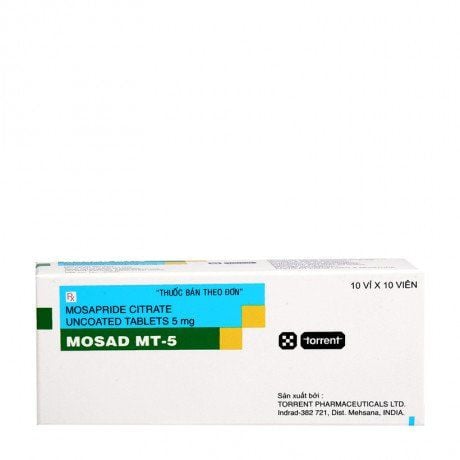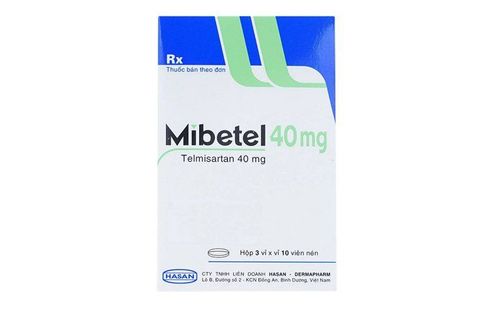This is an automatically translated article.
Ripinavir is used in the treatment of HIV infection, the drug is prescribed by a doctor and has the main ingredients Lopinavir 200mg and Ritonavir 50mg. Let's find out more details about the uses, usage and notes when using Ripinavir for treatment through the article below.
1. What is Ripinavir?
Ripinavir belongs to the group of anti-parasitic, anti-infective, anti-viral, anti-fungal drugs. The drug is prepared in the form of film-coated tablets packed in boxes of 3 blisters x 10 tablets, 1 bottle of 60 tablets, 1 bottle of 120 tablets is a product of SaVi Pharmaceutical Joint Stock Company - VIETNAM.
Ripinavir medicine has the main ingredients Lopinavir 200mg and Ritonavir 50mg. Copovidone, colloidal silicon dioxide, sodium stearyl fumarate, polysorbate 80, hypromellose 606, polyethylene glycol 6000, talc, titanium dioxide, ferric oxide yellow are also included.
2. Indications for taking Ripinavir
Ripinavir is used in cases of HIV infection as a drug to increase the effect of lopinavir, indinavir or saquinavir and in combination with 2 other antiretroviral drugs.
Patients should adhere to using the drug exactly as indicated on the instruction sheet for using Ripinavir or the doctor's prescription.
3. Dosage - How to take Ripinavir
Ripinavir is used by doctor's prescription and taken by mouth. L + R combination tablets can be taken with or without food. The patient should swallow the tablet whole without chewing, biting or crushing the tablet. The patient should take the medicine at the time prescribed by the doctor every day.
Dosage of the drug will be adjusted by the doctor, pharmacist to suit each person, because the effectiveness and tolerance of the drug will vary in each patient.
Adults and adolescents with a body area of 1.3 m2 or greater, 3 capsules twice daily or 5 ml of oral solution (lopinavir 400mg + ritonavir 100 mg/time), twice daily; Children 6 months -13 years old, lopinavir 225 mg/m2/time + ritonavir 57.5 mg/m2/time, twice daily (or 7-15 kg, lopinavir 12 mg/kg/time + ritonavir 3 mg/kg) /time, twice a day From 16-40 kg, lopinavir 10 mg/kg/time + ritonavir 5 mg/kg/time, twice daily). Note: Increase dose by 33% if used with Efavirenz or Nevirapine.
4. Side effects when taking Ripinavir
During the use of Ripinavir, patients may experience some unwanted side effects such as:
Diarrhea, nausea, vomiting, colitis, abdominal bloating, digestive disorders, difficulty swallowing , anorexia, esophagitis Asthenia, headache, insomnia Outburst Dry mouth, pancreatitis Flu-like syndrome Hypertension, tachycardia, chest pain, dyspnea Thrombophlebitis and vasculitis. Agitation, hypertonia, anxiety, ataxia, confusion, dyskinesia, depression, dizziness, paresthesia, peripheral neuritis, somnolence. Cushing's syndrome Hypothyroidism Sexual disorders Anemia, thrombocytopenia, neutropenia, leukopenia. Edema, dehydration, lactic acidosis Joint pain, muscle pain Otitis media, abnormal vision, taste disturbance, tinnitus Hair loss, acne growth, dry skin, sweating, itching, discoloration skin, nail disorders. Lipid dystrophy Effects on metabolism Increased bilirubin and decreased Na Patients should inform their doctor or pharmacist of the side effects they experience while taking Ripinavir for timely handling.
5. Contraindications to taking Ripinavir
Do not use Ripinavir in the following cases:
The patient is a child who is unable to swallow the tablet whole. Contraindicated in breast-feeding patients with a history of hypersensitivity such as toxic epidermal necrolysis, erythema multiforme, Stevens Johnson syndrome to any of the excipients including ritonavir. People with pancreatitis, hepatotoxicity, diabetes, prolongation of PR interval on electrocardiogram, prolongation of QT interval on electrocardiogram, immune reconstitution syndrome, fat redistribution, hyperlipidemia, hemophilia (hemophilia).
6. Pay attention to precautions when using the treatment Ripinavir
In case of pregnancy or suspected of being pregnant, caution should be exercised when using the drug. If you experience any of the above side effects, notify your doctor immediately.
Do not use Ripinavir for nursing mothers, because there is a report from the Centers for Disease Control and Prevention (USA) recommending that HIV-infected mothers should not breastfeed to avoid the risk of transmitting the infection to their babies. . Studies in rats have demonstrated that Lopinavir is excreted in human milk in rats. However, it is uncertain whether it is excreted in human milk. Therefore, do not use Ripinavir in this case.
Because Ripinavir has some side effects such as dizziness, drowsiness, somnolence and headache, so patients must be very careful when driving and operating machinery.
Hopefully with the information provided above, patients can have more useful information about the Ripinavir drug line. Patients should always strictly follow the medication instructions and instructions from the doctor, pharmacist before using Ripinavir, absolutely do not buy the drug at home, self-treatment may cause side effects. I don't want to affect my health.
Follow Vinmec International General Hospital website to get more health, nutrition and beauty information to protect the health of yourself and your loved ones in your family.
Please dial HOTLINE for more information or register for an appointment HERE. Download MyVinmec app to make appointments faster and to manage your bookings easily.













